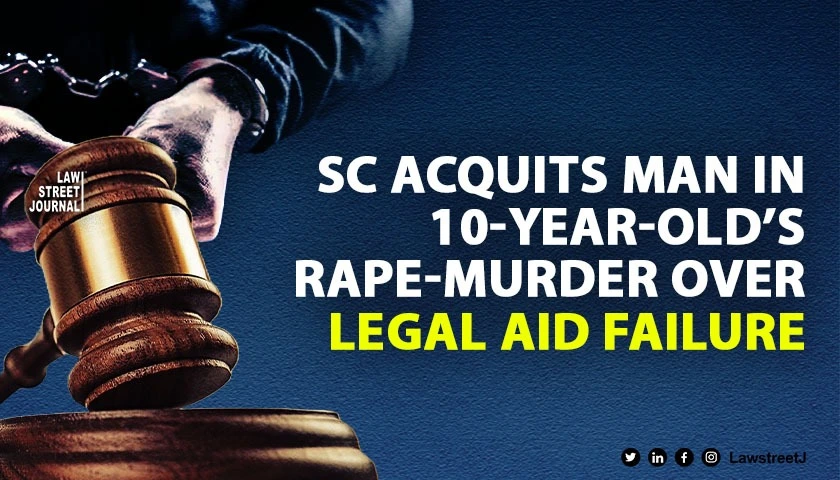NEW DELHI: The Supreme Court on Monday said if effective legal aid is not made available to an accused, unable to engage an advocate, it will amount to infringement of his fundamental rights guaranteed by Article 21 of the Constitution.
Supreme Court Cites Legal Aid Failure in Acquitting Death Row Convict
In a judgment, a bench of Justices Abhay S Oka, Ahsanuddin Amanullah and Augustine George Masih set free a man accused of rape and murder of a 10-year-old girl in 2009, after noting several irregularities including lack of effective legal representation during the trial, with an observation that imposing capital punishment in such a case shocks the conscience of this court.
"Having perused the record of the case, we found a very disturbing feature. It is about the failure of the State to provide timely legal aid to the appellant. The other issue is about the quality of legal aid. Apart from provisions of Article 21 and Article 39A of the Constitution, the law on the issue of the right to legal aid has been evolved by this Court through its landmark decisions," the bench said.
SC Highlights Violation of Article 21 in Rape-Murder Acquittal Case
Emphasising the role of public prosecutor in this regard, the bench said the officer has to play an active role in ensuring that every trial is conducted in a fair manner and in accordance with the law.
The court said if legal aid is provided only for the sake of providing it, it will serve no purpose.
"Legal aid must be effective. Advocates appointed to espouse the cause of the accused must have good knowledge of criminal laws, law of evidence and procedural laws apart from other important statutes. As there is a constitutional right to legal aid, that right will be effective only if the legal aid provided is of a good quality. If the legal aid advocate provided to an accused is not competent enough to conduct the trial efficiently, the rights of the accused will be violated," the bench said.
Appellant Ashok was awarded death penalty by the trial court, after holding him guilty in the case.
The Allahabad High Court, however, commuted the death sentence to life term with remainder of life.
In the case, the court noted the evidence of more than one prosecution witness was recorded in the absence of the legal aid advocate. At the stage of framing the charge, he was not represented by an advocate, it said.
"We are surprised to note that the examination-in-chief of the PW 1 (the girl's father) was allowed to be recorded without giving legal aid counsel. In such a case, a very valuable right of objecting to the questions asked in examination-in-chief is taken away. The accused is also deprived of the right to object to leading questions," the bench said.
The prosecution had relied upon evidence of the victim's seven-year-old who allegedly saw the girl being forcibly taken to the tubewell where the offence was committed.
This witness cannot be held to be of sterling quality, the bench said, saying it is unsafe to base conviction only on his testimony. Even otherwise, taking his testimony as correct, his evidence can, at the highest, be the evidence of last seen together, the bench said.
The court also pointed out in statement recorded under Section 313 of the CrPC, the contents of the incriminating documents were not put to the appellant.
"In a given case, the witnesses may have deposed in a language not known to the accused. In such a case, if the material circumstances appearing in evidence are not put to the accused and explained to the accused, in a language understood by him, it will cause prejudice to the accused," the bench said.
The court noted the date of occurrence is of May 27, 2009. After such a long gap, it will be unjust if the appellant is now told to explain the circumstances and material specifically appearing against him in the evidence.
"Moreover, the appellant had been incarcerated for about 12 years and nine months before he was released on bail. Therefore, considering the long passage of time, there is no option but to hold that the defect cannot be cured at this stage," the bench said.
Even assuming that the evidence of victim's cousin of last seen can be believed, the appellant is entitled to acquittal on the ground of the failure to put incriminating material to him in his examination under Section 313 of the CrPC, the bench said.
"We are surprised to note that both the Trial Court and High Court have overlooked non compliance with the requirements of Section 313 of the CrPC. Shockingly, the Trial Court imposed the death penalty in a case which ought to have resulted in acquittal," the bench said.















